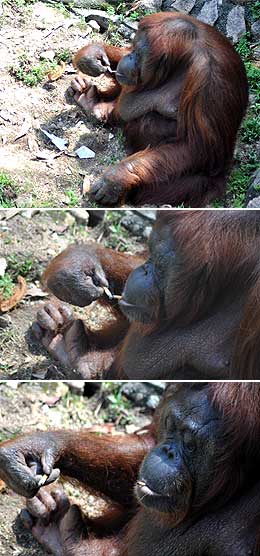I wish to report the following incidences observed whilst I was visiting Johor Zoo on several occasions (most recently on May 2) which I believe to be in contravention of the Protection of Wildlife Act 1972. The details in this report refer mostly to the May 2 visit.
 A female orangutan named ‘Shirley' has been observed to be heavily addicted to cigarettes at Johor Zoo. She was seen trying to light a ‘beedee' (rolled up tobacco in leaves) using a lighted cigarette butt. After taking several puffs from the ‘beedee' she walked to another corner of her enclosure and tried to ‘make her own type of cigarette' using a dried leave.
A female orangutan named ‘Shirley' has been observed to be heavily addicted to cigarettes at Johor Zoo. She was seen trying to light a ‘beedee' (rolled up tobacco in leaves) using a lighted cigarette butt. After taking several puffs from the ‘beedee' she walked to another corner of her enclosure and tried to ‘make her own type of cigarette' using a dried leave.
When she did not succeed in lighting it, she sat looking dazed and finally took deep puffs from her cigarette. She was clearly showing signs suggesting a kind of ‘nicotine withdrawal syndrome'. She was later seen begging visitors who were standing around her exhibit for cigarettes. She did this by throwing a used cigarette butt at the visitors so that they would throw one back to her.
This addiction to cigarettes exposes ‘Shirley' to various lung diseases such as lung cancer, emphysema and bronchial disorders. She is also at risk of heart diseases such as stroke, heart attack, vascular disease and aneurysm. And above all, a female smoker has an increased risk of miscarriage, stillborn and premature infants.
This female orangutan and her mate are also being exposed repeatedly to the risk of germs from the saliva of those who throw her lighted cigarettes. The potential for disease transfer, both humans to orangutan and orangutan to human is very high, due to the close genetic relationship between humans and great apes.
Pneumonia, influenza, tuberculosis, hepatitis A, B, C and E, cholera, herpes, parasites and even the common cold can all be passed between humans and great apes.
Confining non-human apes indefinitely in an exhibit and allowing them to succumb to addiction on nicotine thereby causing chronic deterioration of their health is in contravention of Wildlife Protection Act 1972 (Act 76) as stated below:
Act 76 Section 92 1(f) willfully does and willfully omits to do anything which in any way causes any unnecessary suffering pain or discomfort to an animal or wild bird is guilty of an offence and shall on conviction be liable to a fine not exceeding five thousand ringgit or a term of imprisonment not exceeding three years or both.
Is Shirley doomed to suffer and eventually die because of her addiction to cigarettes?
It is the responsibility of Abdul Rashid Samsudin, director-general, Department of Wildlife and National Parks, to ensure the Protection of Wildlife Act 1972 is enforced and that no animals suffer unnecessarily. This existing law provides ample provision for the department to intervene in this matter.
We call on Minister Douglas Uggah Embas to ensure Shirley is provided with immediate help to cure her of her addiction (this needs expert guidance) and the Johor Zoo management is requested to take appropriate measures to ensure zoo visitors are no longer able to throw any foreign objects into Shirley's cage.
Whilst writing may I take this opportunity to remind Perhilitan (Wildlife Department) that we have submitted at least five reports, some dating back to January. All await formal responses from Perhilitan.
Such delays, lack of transparency, lack of care to the animals concerned, only serves to make more people complain and question the integrity of Perhilitan, a department if I may say so, whose reputation in the eyes of the public could not really sink any lower.
No one trusts Perhilitan. I do not say this to be rude; I say it so that the government is made aware of this rapidly deteriorating situation, one caused entirely by Perhilitan's consistent refusal to act on reports by both Nature Alert and those we read about in the media.
To become known as a nation which not does not care about, worse still, actively condones the brutal treatment of and the illegal trade in wild animals, if I may say.
The writer is chief executive, Nature Alert .

